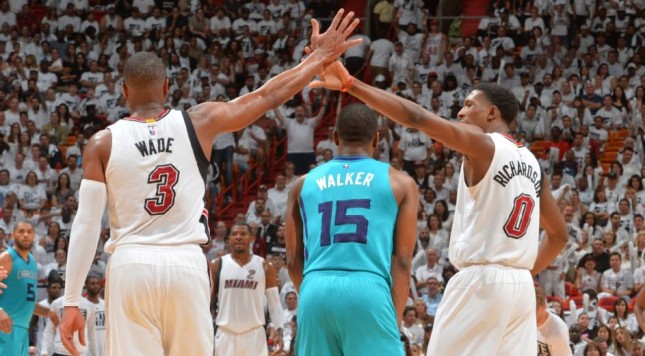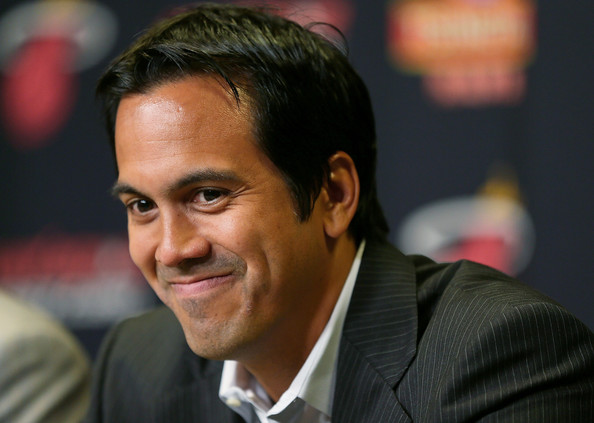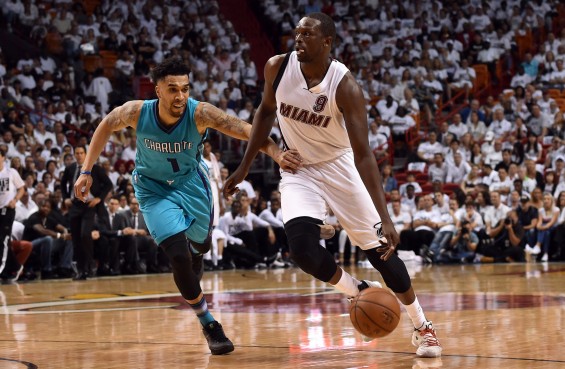The Miami Heat have been the best team in the NBA over the past five days, in which all 16 playoff teams have played two games.
You saw that coming during the regular season, didn’t you?
If you say yes, you are either a family member of someone in the Heat organization… or you’re a liar.
NO ONE saw this coming from a team which — we remind you — is without Chris Bosh, probably for the duration of the playoffs.
No Bosh, no problem — at least through two games against the Charlotte Hornets.
How have the Heat done this? Coach Erik Spoelstra certainly deserves some credit, but as Steve Clifford essentially pointed out after Game 2 on Wednesday night, it’s as simple as a guy going 6 for 8 instead of 1 for 8 from the field.
If Miami wasn’t tickling the twine so regularly, we wouldn’t view Spoelstra’s coaching in the same light. Yet, the better coaches in any sport get their teams to play well in the postseason, and when adjusted for opponent, no team has looked better through two playoff games than the Heat. They’re most definitely on, and Charlotte has to find the off switch when the series moves to the Carolinas for Game 3.
First things first: Spoelstra has done a phenomenal job with the Heat this season, and not just within the context of the first two games of the playoffs.
Miami was floundering in the middle of January. The Heat woke up on the morning of January 25 with a 23-21 record. The team had averaged 80 points in a four-game stretch of misery, one which included these shooting lines from three-point range: 4 of 14, 5 of 22, and 4 of 17. That four-game deep freeze for the Heat was part of a larger seven-game sequence in which the team failed to score 100 points. It was also part of a regular season in which the Heat were 27th or worse in all three 3-point-shooting categories: makes, attempts and percentage.
Spoelstra knew something had to change, but of course, there’s a big gap between knowing and implementing. It’s one thing to make changes; it’s quite another for the changes to work.
Spoelstra’s fundamental adjustment — playing faster to suit Goran Dragic and make him the comfortable facilitator for the offense — paid off handsomely. Spoelstra’s player development process with Josh Richardson created an emergent three-point shooter who could take pressure off other players, lengthen the bench, and space the floor.
The Heat — barely above .500 through 44 games — went 25-13 in their remaining 38 games, and when Washington upset Atlanta in Game 82, the very fortunate Heat gained the No. 3 seed and home court in the first round while also avoiding Cleveland’s half of the East bracket.
A word about that “very fortunate” part is merited here: As well as the Heat played from February through early April, they still hit some ruts at times, never more so than in their own Game 82 against Boston. The Heat roared to a 62-38 halftime lead… and then scored five points in the third quarter, part of a second-half meltdown which almost cost them the third seed. Only because of the Wizards’ win against the Hawks did Miami receive a favorable bracket. Even though this team remade itself, that clunker against Boston reminded the NBA that the Heat still had a way to go in terms of their overall evolution and development.
This is what makes the first two games against Charlotte so surprising… even though Spoelstra has been outstanding at exploiting his matchup advantage with Dwyane Wade, and even though Spo also neutralized Charlotte late in Game 2 by going small with Justise Winslow at the 5.
For all the adjustments Spoelstra has made, his players are simply making shots at a rate not seen in the regular season.
Luol Deng hit 34 percent of his threes in the regular season. He’s above 54 percent through two playoff games, and he’s making 71 percent of all field goal attempts.
Winslow isn’t scoring gobs of points, but a 4-of-6 shooting line in Game 2 — hitting shots when he takes them — makes the Heat that much harder to guard.
Not to be lost in the shuffle, Hassan Whiteside — who struggled at times on defense — compensated for his off night at that end of the floor by hitting all eight of his field goal attempts.
These extremely efficient performances are all noteworthy game-changing developments in isolation; that the Heat are getting all of them at the same time is quite remarkable… and none of this even includes the more expected success stories of the offense: Wade dominating in the playoffs against a team which can’t match up with him, and Josh Richardson making his perimeter jumpers.
Without Chris Bosh, Miami has hit over 57 percent of its field goals — not just on average in this series, but in both Game 1 and Game 2 as separate stand-alone performances. The Heat have hit at least 50 percent of their threes in both Game 1 (9-18) and Game 2 (9-16), and what amplifies that stat is that Joe Johnson — the man who ostensibly needed to rescue this team’s perimeter shooting — has played a peripheral role in this series. He’s not playing poorly, but he hasn’t been a foremost option, taking a combined total of 13 shots in two games. He has attempted only four three-pointers in the first two games of the series, making two. He has scored a combined total of 19 points.
If you had told Steve Clifford and the Hornets that Joe Johnson would be that quiet in the first two games, they probably would have welcomed such a scenario.
Yet, Charlotte has been dusted by 32 and 12 points in these games.
*
Where did this Miami Heat team come from? Yes, it came from Erik Spoelstra’s adjustments and player development skills, but that’s not the full answer. The Heat’s ability to shoot uncommonly well marks an extraordinary reversal — engineered in the course of just a few months.
Will Miami have to pay a Heat bill, or will this surge in solar energy remain cost-effective as the playoffs move forward?
The legitimacy of that question is itself a commentary on how far the Heat have come in a very short time.



